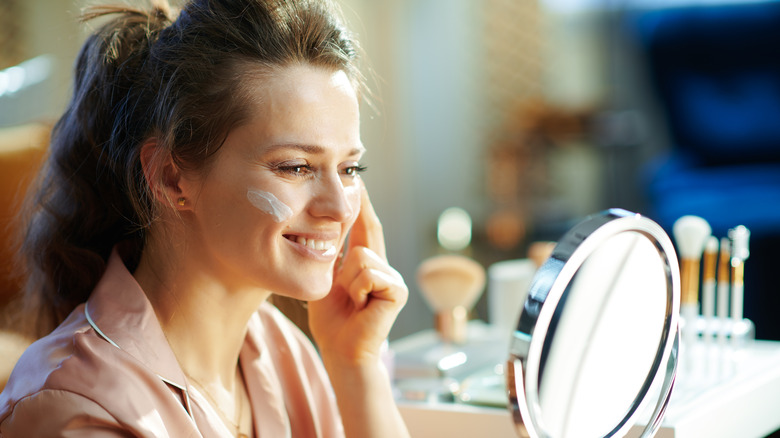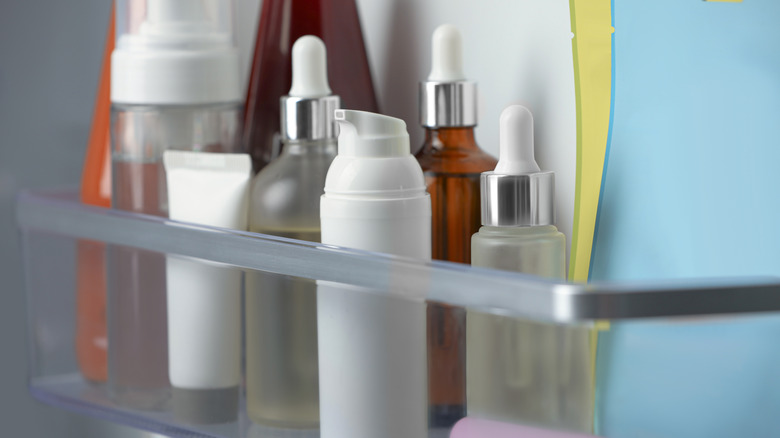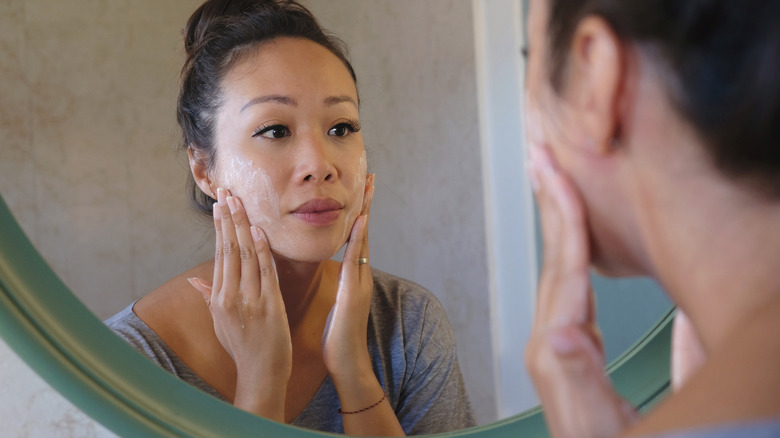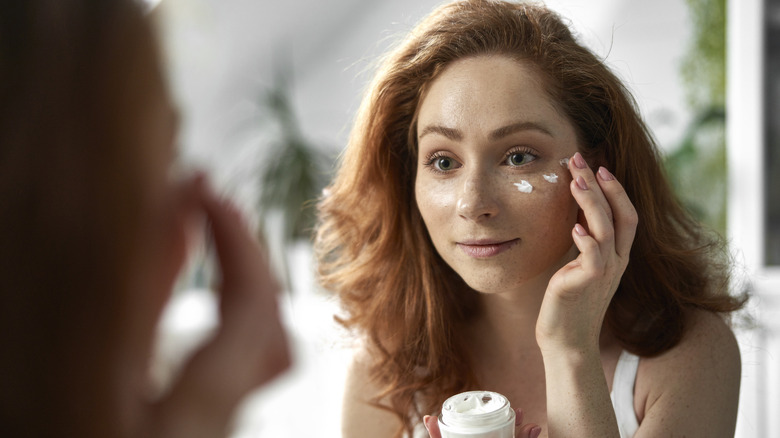The Skincare Benefits Of Copper Peptides
We may receive a commission on purchases made from links.
If you're in the know when it comes to skincare, then you've probably heard of copper peptides. The amino acid is a mainstay in serums and moisturizers, with experts calling it an essential ingredient for fighting wrinkles and dark spots. As prescribing clinician and dermatology expert Michael Sam-Yorke put it to SpaceNK, "Copper peptides are one of the most important parts of any anti-aging skincare routine."
As a member of the peptide family, copper peptides have the ability to add elasticity back to the skin, giving it a plump and healthy appearance. "Peptides are in fact the building blocks of protein that make up the foundation of our skin. As we start to age, the levels of protein in our skin starts to reduce, leading to the loss of elasticity, which results in sagging skin and the formation of wrinkles," Sam-Yorke explained. Though copper peptides occur naturally in the skin (Dr. Rachel Nazarian, a board-certified dermatologist, explained to Shape, their primary function is injury repair), the version found in skincare products is usually created from plants and animals or in a lab. But even those synthetically engineered peptides offer a myriad of skincare benefits worth your while.
Copper peptides are known to encourage collagen and elastin production
Dr. Usman Qureshi, an aesthetic doctor and founder of Luxe Skin by Dr Q, explained to Sheerluxe that over the years, the collagen, elastin, and amino acids (including copper peptides) naturally found in the skin gradually decrease. The more this happens, the more they need external help to keep the skin looking young.
That's where topical products like peptides come in handy. As Dr. Tiffany J. Libby, board-certified and Reserveage resident dermatologist, explained to Real Simple, copper peptides are best known for encouraging skin to produce collagen and elastin. This in turn can minimize the overall appearance of fine lines and wrinkles. Indeed, one 2015 research review found that people who applied products containing copper peptides daily for 12 weeks saw an improvement in the appearance of wrinkles on the skin, along with a smoother, plump appearance "They're great for those looking to reverse the signs of aging," Sam-Yorke noted to SpaceNK.
And they have antioxidant effects which can help with blemishes
Dr. Tiffany J. Libby explained while speaking to Real Simple that copper peptides have antioxidant properties, which can help to target the bad toxins that end up on our skin on a daily basis. They can also help to reduce inflammation on the skin and help to protect it against any further oxidant damage.
For some people, copper peptides can also be an effective supplemental ingredient for a blemish and acne fighting routine. As Dr. Marie Hayag, a board-certified dermatologist and founder of 5th Avenue Aesthetics, told Byrdie, "Another benefit is that it can help with acne by normalizing the bacterial concentration on the skin." Skincare specialist and founder of WOW Facial, Claire Williams, further explained to Sheerluxe that this happens because copper peptides have the ability to regulate bacteria on the skin. "This in turn helps combat spots and blemishes — as well as the scars sometimes left behind by old breakouts." she claimed.
That's not all. Copper peptides can also have anti-inflammatory properties that can help with even more imperfections on the skin. Dr. Libby shared that it can help to even out hyperpigmentation, reduce the appearance of scars not caused by blemishes, and can even tone down inflammation and redness.
Copper peptides can be paired with a number of other skincare products
We've all been there, desperately reading the backs of new skincare products and frantically Googling to make sure it can actually mix with everything contained in the pricey new item we just bought. But you shouldn't find yourself worrying too much with copper peptides. Although it's not recommended you use them alongside retinol, vitamin C (which can be an alternative for copper peptides), and alpha-hydroxy acids (AHAs)as they may dilute their potency, it generally plays well with most other ingredients. Copper peptides are considered gentle, so are unlikely to have a strong reaction on the skin – as long as it's used in its recommended percentage.
Board-certified dermatologist Dr. Azadeh Shirazi, recommended applying peptides alongside moisturizing products. "It's best to use copper peptides with hydrating ingredients like hyaluronic acid and glycerin, as they work like humectants to draw moisture to the skin's barrier," she told Shape. As for what else you're safe to apply alongside copper peptides? Niacinamide. "[Together they help] to minimize redness and brighten skin, all which help improve skin's overall tone and appearance," Dr. Tiffany J. Libby confirmed to Real Simple. Just remember to apply your products in layers rather than actually mixing them — especially if one has an SPF.
And they can promote skin hydration as well
If there's one cardinal rule about how to keep skin looking young for longer, it has to be keeping it hydrated. And copper peptides can do just that. Though it's not the most hydrating product on the market on its own, Dr. Marisa Garshick, a board-certified dermatologist at MDCS Dermatology, explained to Shape that it does still have some moisturizing benefits for the skin. "Copper peptides promote the production of glycosaminoglycans [molecules that bind to water], such as hyaluronic acid, so they help boost moisture," she shared.
Dr. Usman Qureshi told Sheerluxe that copper peptides can also have their uses in simply keeping your skin's hydration levels steady. "Peptides are essential for strengthening the skin's defenses, maintaining hydration, resilience and its overall appearance," he said. If you have dry skin, try to get your hands on a moisturizer containing copper peptides for the best of both worlds.
But you should always be careful when adding something new into your skincare routine
With any new skincare product brought into your routine, it's important to be cautious when applying it to your skin. Dr. Tiffany J. Libby told Real Simple that it's rare to see side effects from copper peptides, but doing a patch test before you apply it to your face for the first time will allow you to make sure you aren't allergic to it and ensure it won't irritate your skin. Notably though, in some rarer cases, copper peptides have been known to cause redness. So, if you have particularly sensitive skin, it's a good idea to introduce any products containing copper peptides into your routine slowly. Claire Williams also told Sheerluxe that people who have skin that is damaged or peeling should avoid the ingredient until their skin is healthier.
Equally, if you plan to keep any retinoids, vitamin C, strong antioxidants, or acids in your skincare routine, you'll want to alternate when in the day you apply them to avoid any issues. Prudvi Kaka, chief scientific officer at Deciem, suggested to SpaceNK, "Should any of these ingredients be present in an existing routine, they should be applied separately, i.e. one in the morning and the other in the evening or alternate mornings/evenings."





